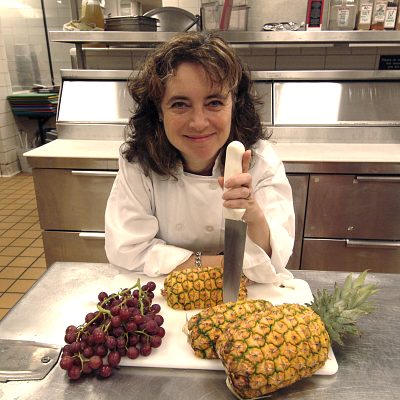Beth Kalikoff may be the only author whose doctoral dissertation helped prepare her for writing a mystery novel.
Kalikoff, an assistant professor in Interdisciplinary Studies at the UW Tacoma, wrote a dissertation that later became a nonfiction book titled Murder and Moral Decay in Victorian Popular Literature. Now she’s written a novel called Dying for a Blue Plate Special that not only includes a murder, but is set in Tacoma, where she teaches.
“I like reading murder mysteries, and one of my scholarly fields is popular literature, so I’ve written a lot about detective stories, mysteries, crime melodramas,” Kalikoff said. “And I read a lot of 19th and 20th century mysteries, so I just thought it would be fun to try and see if I could do it.”
She could, and she did. Dying for a Blue Plate Special follows the adventures of Jewel Feynmann, owner of Blue Plate Catering, who is drawn into a murder case when a client is poisoned during one of her dinners.
That dinner, incidentally, takes place at a university, (the victim is a dean) but it very clearly isn’t UWT. In the book it’s called Commencement Bay University, a small liberal arts school nicknamed “Zoo U” because of its proximity to Point Defiance Zoo. Hmm. Sounds a little like the University of Puget Sound, where Kalikoff has also taught. But she denies that UPS is Zoo U. Actually, she claims, Zoo U. is the University of Anywhere.
Mentioning the other two universities where she’s taught — Indiana University as a graduate student and Eastern Illinois University, where she got her first job — Kalikoff says the book’s setting is “kind of soaked in that 25 year experience.” And, she says, college professors from other schools who read the book tell her, “This sounds so familiar.”
“Apparently there are some qualities of the fictional campus that speak to a lot of similar campuses,” she said.
As for her heroine, Jewel, Kalikoff says she and Jewel have two things in common — they’re both Jewish and from New Jersey. But although Kalikoff has stints as short order cook and waitress on her resume, cooking is not her strong suit. As she puts it on the book’s jacket, her specialty is “three things on a plate.”
So why make Jewel a caterer? Largely because of the profession’s mobility, Kalikoff said. A caterer gets to go into different situations every day and thus there are many chances for the unexpected to happen.
“Also,” she added, “even though I’m not good cook, I’m a good eater. I’m interested in food.”
Although UWT doesn’t figure in the novel, Tacoma definitely does. Kalikoff calls the city an interesting one for a writer because it “has a sense of itself as a second class citizen. So Tacoma doesn’t feel it’s arrived yet. It’s still in motion.” She includes many real locations in the book, including some real restaurants, all of which are portrayed in a flattering light. The restaurants that are criticized in the book, Kalikoff explained, are the ones she made up.
How does novel writing compare to scholarly writing? “I found it thrilling and easier and comical by comparison with my other writing,” Kalikoff said. “You do research, but not the same kind you do as a scholar, so it feels quick and dirty, which is fun. The problems you’re solving are so different from the ones you’re solving as a scholar.”
Nevertheless, Kalikoff says, there was a learning curve, and that she learned how to write a novel in the process of writing one. Her first draft took a year, after which she kept putting the manuscript away and getting it out again, before finally deciding she was ready to try selling it. And that, she says, took a long time.
The book has been out since May and is doing very well. In fact, it sold out of its first, relatively small run and is well into its second.
Kalikoff is encouraged enough that she’s planning more mysteries, all featuring her catering sleuth and of course, Tacoma.
“Now that I’ve learned how to write a novel, I don’t want to stop,” she said. “The next one is going to involve historical restoration and how a building gets landmark status.”
She can also bring her avocation directly into the classroom, because one of the classes she teaches is Writing Popular Fiction. “The experience of writing the book has refreshed my compassion for student writers,” Kalikoff said. “I have more expertise; I have more experience. But the practice of peer review, of showing your work to an audience — the challenging midwifery of bringing ideas into the light — that’s something I share with my students, and it was a good reminder.”
For a sample of Dying for a Blue Plate Special, go to www.bethkalikoff.com.
